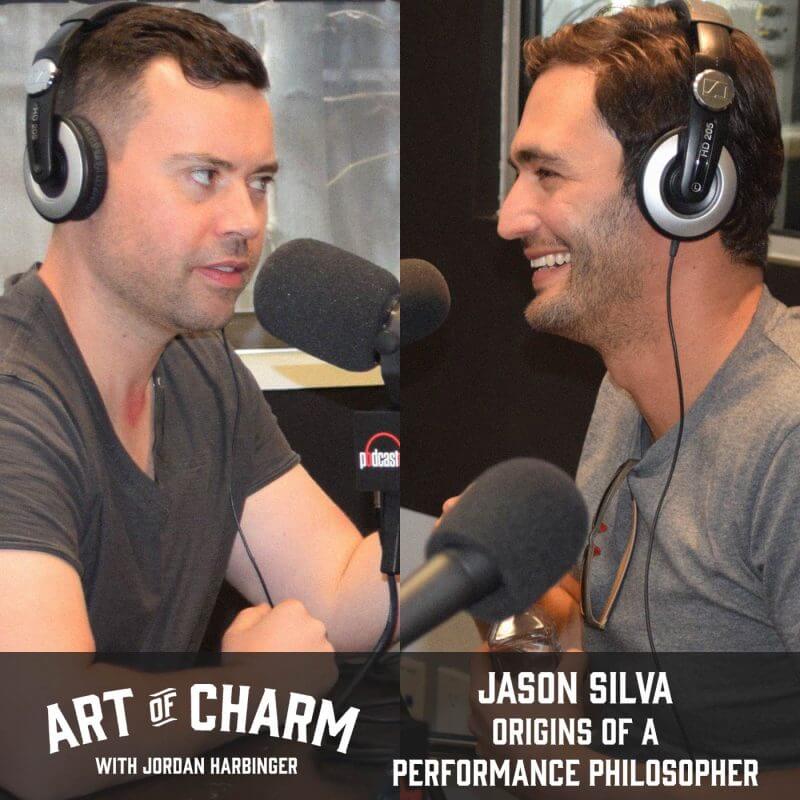Jason Silva (@JasonSilva) would have been called a “performance philosopher” by counterculture icon Timothy Leary. Among many things, he’s a futurist, filmmaker, creator of short video series Shots of Awe, former host of the National Geographic Channel’s Brain Games and current host of Origins: The Journey of Humankind.
“In the information age, you don’t teach philosophy…you perform it.” -Timothy Leary
“Everything I do is a response against meaninglessness.” -Jason Silva
The Cheat Sheet:
- How our concepts of self are formed — often through the eyes of others — and how they affect our behavior.
- How top performers excel by shutting down the editorial parts of the human brain coined by Buddhists as the monkey mind.
- Why “unscripted” isn’t the same as “unprepared,” and how videos can be edited to elicit altered states of consciousness.
- How good directors help performers get out of their heads — while bad directors do just the opposite.
- How is day-to-day reality edited by context, similar to the Kuleshov effect demonstrated by Alfred Hitchcock?
- And so much more…
[aoc-subscribe]
Taking a cue from Timothy Leary’s statement that one doesn’t teach philosophy in the information age, but performs it, our guest Jason Silva has been making short films since the early ’90s in his native Venezuela. This led to a double-major in film and philosophy and the creation of film short series Shots of Awe.
Jason was the host of the National Geographic Channel’s Brain Games and is the current host of Origins: The Journey of Humankind. Here, he joins us to talk about how our perception of the way others see us shapes our behavior, how top performers achieve greatness by shutting down parts of the brain, tricks a filmmaker uses to alter audience consciousness, why nature walks are good for contemplative introspection, why bland architecture is bad for us, and lots more — the list of resources at the bottom of this page may be the longest on AoC to date! Listen, learn, and enjoy!
More About This Show
Long before “vlogging” became a thing, Jason Silva was making short films back in the early ’90s in his native Venezuela.
“I was doing videos and short films,” says Jason. “I’d been obsessed with the camera and I think it was mostly because it was a way of capturing reality. I was always acutely aware of how ephemeral life is — how ephemeral moments are. Everything is impermanent. Everything is temporary…if I can capture it, I can own it. Internalize temporary moments.
“I went to film school, double-majored in film and philosophy, and then I got to college and ended up getting a gig at Current with Max (Lugavere); we worked there for four years and when I left the network, I just wanted to go back to doing these philosophical short films and put them on the Internet.”
This was around 2010, when online video was still gaining acceptance as a respectable medium. Now, an online presence is almost assumed to be part of any serious media portfolio.
Perhaps the prevalence of smartphone cameras these days makes us less skittish about the notion of being recorded than it once did, but our behavior is still modified by how we perceive others to perceive us, as noted by Charles Horton Cooley in the early 1900s when he coined the phrase looking glass self. This can be a challenge to anyone — say a documentary filmmaker or a performance philosopher like Jason — who is trying to capture people at their most authentic.
“Philosophizing is a verb,” says Jason. “It’s an act lived out loud. It’s pondering and contemplating. It’s not something prescripted or even thought out beforehand as much as discovered in real time as you probe the idea. But that requires getting out of your head. It requires silencing what Steven Kotler calls “the inner critic” — the dorsolateral prefrontal cortex.
“That’s when I kind of fell in love with some of the ideas of the Flow Genome Project and their new book Stealing Fire and all about silencing the monkey mind. The key idea is this part of the brain that is doing the self-editing, the inner critic, the self-doubt, the overthinking of everything, we’ve inherited. It was planning for the future. It was worrying about the predator.
“We are the descendants of the most neurotic humans. It served us very well. It allows us to think about the future and plan accordingly. Fair enough. But it also betrays us because it prevents us from ever truly being in the present because we’re always five steps ahead. And when there’s not things to worry about, we’re still finding things to worry about. Like, now my self-esteem is what I’m worried about. Now I’m worried about how I’m coming across — not the fact that a lion is going to eat me!
“But it turns out, and this comes from those fMRI scans they did on freestyle rappers…freestyle rappers shut down the neocortical hardware. The dorsolateral prefrontal cortex. In the zone. The jazz musician in the pocket. The elite athlete when he surrenders and submits to the amazing feat of athleticism. In these moments, as [Flow Genome’s] Jamie Wheal says, ‘The aperture focuses.’ It’s not so much you use more of your brain. It’s actually that you shut down parts of the brain that don’t serve you in that moment and the self experiences that as liberation.
“So with my videos, I quickly realized that’s the function they served for me. That was my jazz. That’s why they’re fully improvised, [and] they allow me to dive into the moment.”
Listen to this episode of The Art of Charm in its entirety to learn more about the looking glass self, why jazz musicians found the partaking of a little reefer madness conducive to reaching the flow state, why “unscripted” doesn’t mean “unprepared,” how videos are edited to elicit altered states of consciousness, how good directors help performers get out of their heads — while bad directors do just the opposite, how day-to-day reality is edited by context, why some people under the influence of a certain substance can experience peace while others have a bad trip, the psychological toll of terrible architecture, human cultural evolution, and lots more.
THANKS, JASON SILVA!
If you enjoyed this session with Jason Silva, let him know by clicking on the link below and sending him a quick shout out at Twitter:
Click here to thank Jason Silva at Twitter!
Resources from This Episode:
- Transcript for Jason Silva | Origins of a Performance Philosopher (Episode 603)
- Shots of Awe
- Origins: The Journey of Humankind on the National Geographic Channel
- Jason Silva’s website
- Jason Silva at Facebook
- Jason Silva at Instagram
- Jason Silva at Twitter
- Brain Games on the National Geographic Channel
- Steven Kotler | Stealing Fire (Episode 590)
- Peter Diamandis | Bold in Abundance (Episode 587)
- Kevin Kelly | Inevitable Future (Episode 559)
- Max Lugavere | Bread Head and Preventing Alzheimer’s (Bonus)
- Others in Mind: Social Origins of Self-Consciousness by Philippe Rochat
- Human Nature and the Social Order by Charles Horton Cooley
- Gödel, Escher, Bach: An Eternal Golden Braid by Douglas R. Hofstadter
- Info-Psychology: A Manual for the Use of the Human Nervous System According to the Instructions of the Manufacturers, and a Navigational Guide for Piloting the Evolution of the Human Individual by Timothy Leary
- What the Dormouse Said: How the Sixties Counterculture Shaped the Personal Computer Industry by John Markoff
- Flow Genome Project
- The Neuroanatomy of Freestyle Rap by Lindsay Abrams, The Atlantic
- Hacking the GENOME of Flow: Jamie Wheal at TEDxVeniceBeach
- Black Swan
- Edge Foundation
- The Hero with a Thousand Faces (The Collected Works of Joseph Campbell) by Joseph Campbell
- The Medium is the Massage by Marshall McLuhan and Quentin Fiore
- Hitchcock’s Pure Cinema “The Kuleshov Effect”
- Arrival: A Response To Bad Movies by Evan Puschak
- On Drugs by David Lenson
- The Extended Mind by Andy Clark and David Chalmers
- Natural-Born Cyborgs: Minds, Technologies, and the Future of Human Intelligence by Andy Clark
- The Denial of Death by Ernest Becker
You’ll Also Like:
- The Art of Charm Challenge (click here or text 38470 in the US)
- The Art of Charm Bootcamps
- Best of The Art of Charm Podcast
- The Art of Charm Toolbox
- The Art of Charm Toolbox for Women
- Find out more about the team who makes The Art of Charm podcast here!
On your phone? Click here to write us a well-deserved iTunes review and help us outrank the riffraff!




